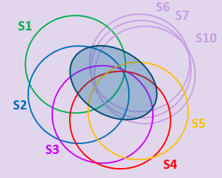 The ELF in TIGs (English as a lingua franca in Transient International Groups) project has the aim of establishing a comprehensive conceptual, methodological and descriptive framework for the study of communication in transient lingua franca contexts, i.e. situations that are too short-lived, fleeting or unstable to be considered communities of practice. It is concerned with the systematic empirical description of how communication evolves in interaction in different ELF contexts and in different group constellations across time. Overarching questions that drive research in the project include: Under which contextual circumstances do multilingual speakers in different TIGs engage in which linguistic practices to what extent? Which linguistic practices and salient sociolinguistic or pragmatic phenomena can be observed during different phases of group formation, interaction and negotiation in different (E)LF contexts?
The ELF in TIGs (English as a lingua franca in Transient International Groups) project has the aim of establishing a comprehensive conceptual, methodological and descriptive framework for the study of communication in transient lingua franca contexts, i.e. situations that are too short-lived, fleeting or unstable to be considered communities of practice. It is concerned with the systematic empirical description of how communication evolves in interaction in different ELF contexts and in different group constellations across time. Overarching questions that drive research in the project include: Under which contextual circumstances do multilingual speakers in different TIGs engage in which linguistic practices to what extent? Which linguistic practices and salient sociolinguistic or pragmatic phenomena can be observed during different phases of group formation, interaction and negotiation in different (E)LF contexts?
Micro-diachronic analysis
Relying on ethnographic methods for data collection (video recording of naturally-occurring spoken ELF interactions, detailed orthographic transcription, interviews), the project combines corpus linguistics, interactional sociolinguistics, conversation analysis, pragmatics and discourse analysis. It develops a micro-diachronic approach for the analysis of (spoken) interaction in order to provide more detailed empirical descriptions of how language changes in groups of speakers in real-time interactions. This innovative methodological approach is used to analyze lexical and pragmatic processes in TIGs, such as situational/group-specific multilingual practices or lexical accommodation (creativity, convergence, divergence). The use of qualitative data analysis software and corpus technologies on detailed transcripts makes it possible to systematically trace – and visually represent – the emergence and development of different communicative practices throughout ELF interactions in real time (i.e. micro-diachronically).
Description of ELF-TIG data
The micro-diachronic methodology is applied, tested and fine-tuned on different ELF-TIG data sets in the project. Some analyses are carried out on speech events that represent different TIGs in VOICE, but ELF-TIG data have also been recorded specifically for the project. An additional ELF-TIG data set of twelve weekly-meetings in a fluctuating team of young multilingual professionals was audio- and video-recorded over the course of three months in a co-working space in Vienna. The detailed orthographic transcription of all twelve meetings will be complete by the end of 2020. Drawing on these data, the principles of micro-diachronic analysis will be systematically expanded on different TIG interactions throughout the project.
Meta-analysis
In addition to micro-diachronic analyses, the project aims to devise a comprehensive framework for TIGs that can be used to systematize multilingual/lingua franca contexts. Salient TIG parameters of the framework will serve as conceptual tools and categories for a meta-analysis of ELF publications. This meta-analysis will relate existing descriptive ELF findings according to new group parameters. The intention is to put forward initial propositions about the salience of different (socio)linguistic and pragmatic processes in different phases of group development and different kinds of TIGs, beyond the descriptive research carried out in the ELF in TIGs project.
Wider implications
Once specified and more established, the methodology and parameters of the TIGs framework could be applied by scholars to describe and conceptualize communication in a wide range of situations of transient language contact. Micro-diachronic portraits of group interaction might thus open up new avenues for the study of variation and change in sociolinguistics and pragmatics beyond the study of ELF and lingua franca interactions.
Funding
The ELF in TIGs project is funded by the Austrian Science Fund FWF under the Elise-Richter Grant scheme (Grant no. V 747: English as a lingua franca in Transient International Groups, funded amount: 280,497 €, principal investigator: Marie-Luise Pitzl).
Duration
October 2019 - October 2022
Other projects